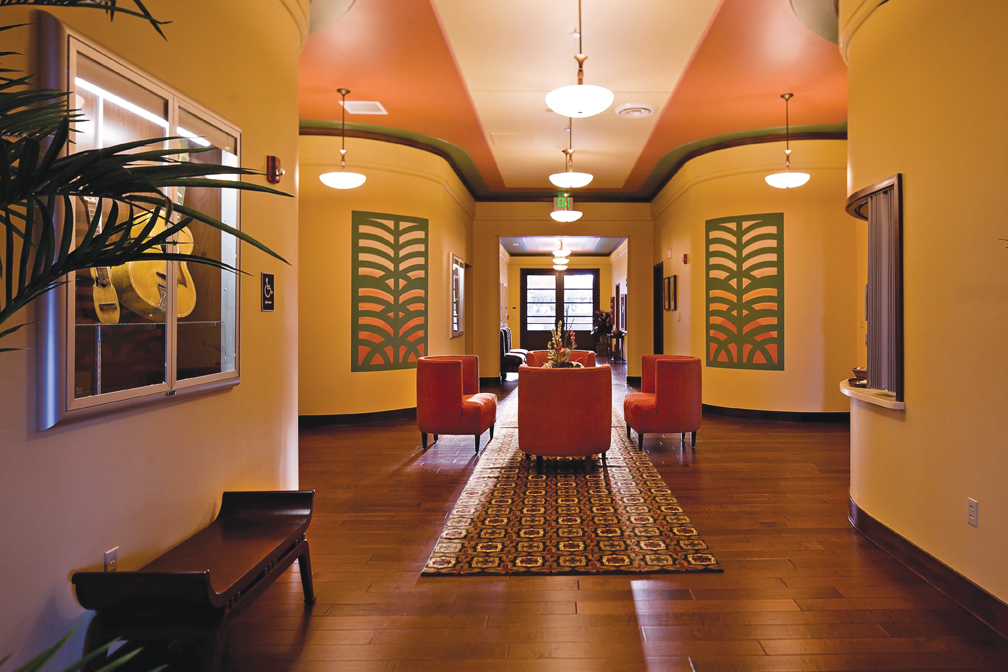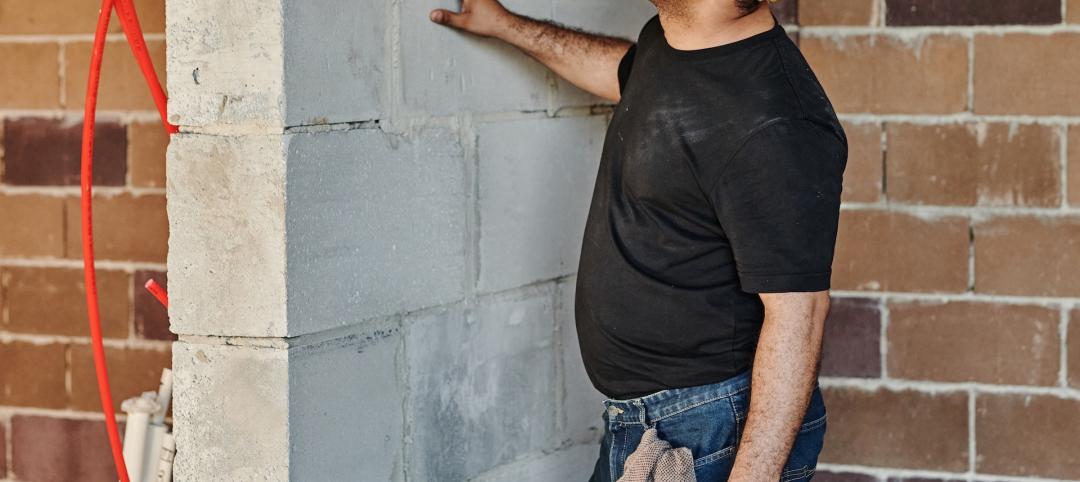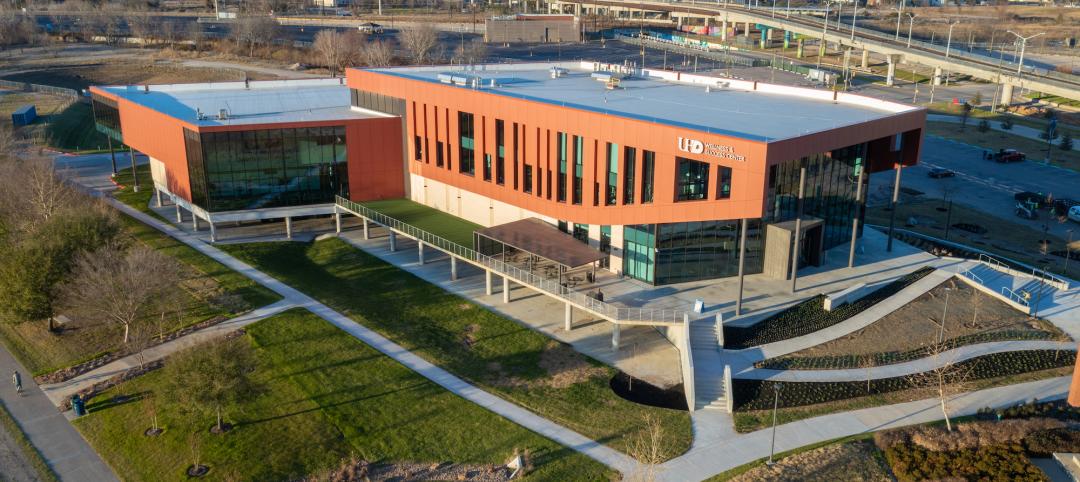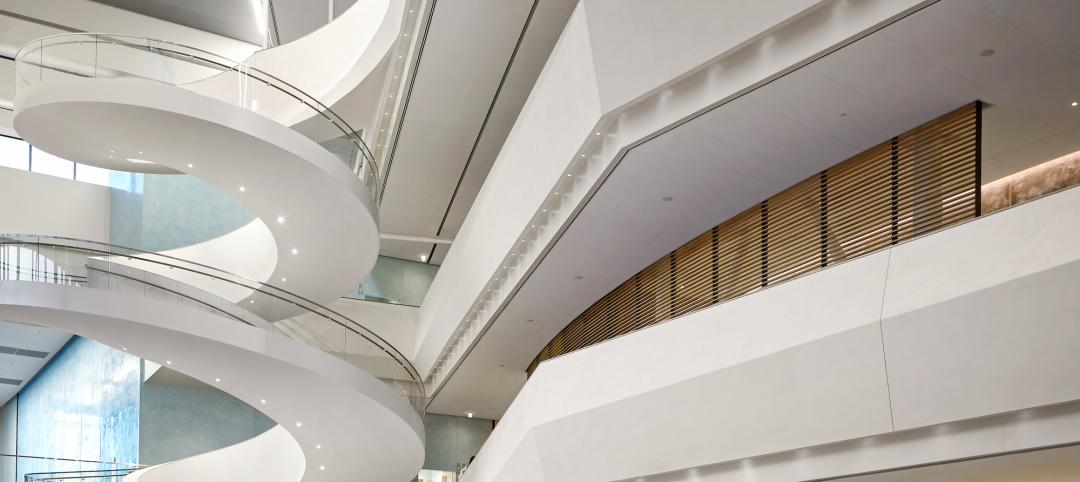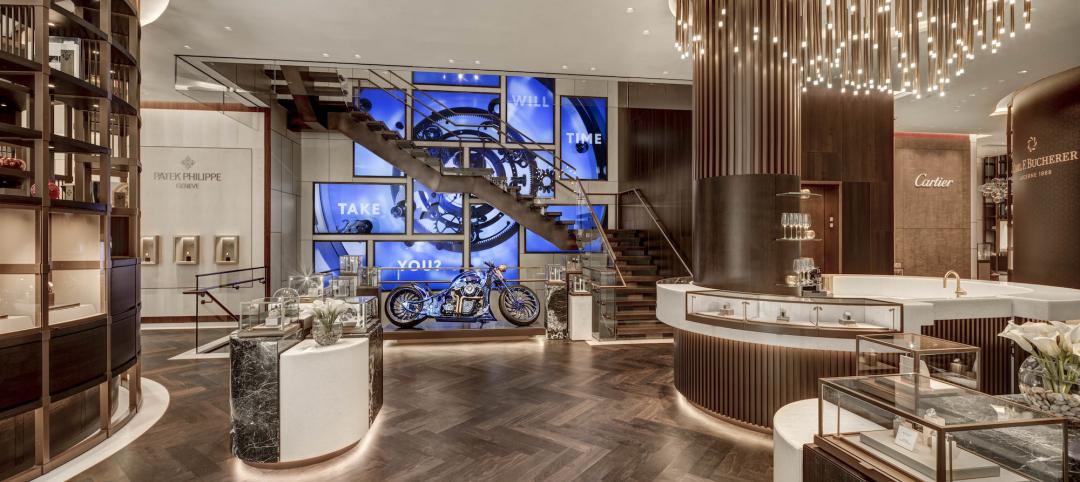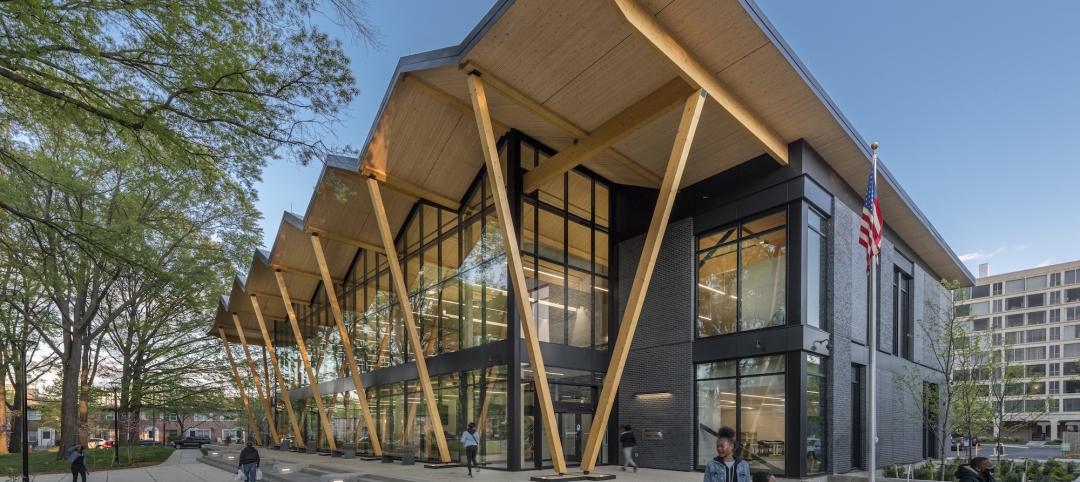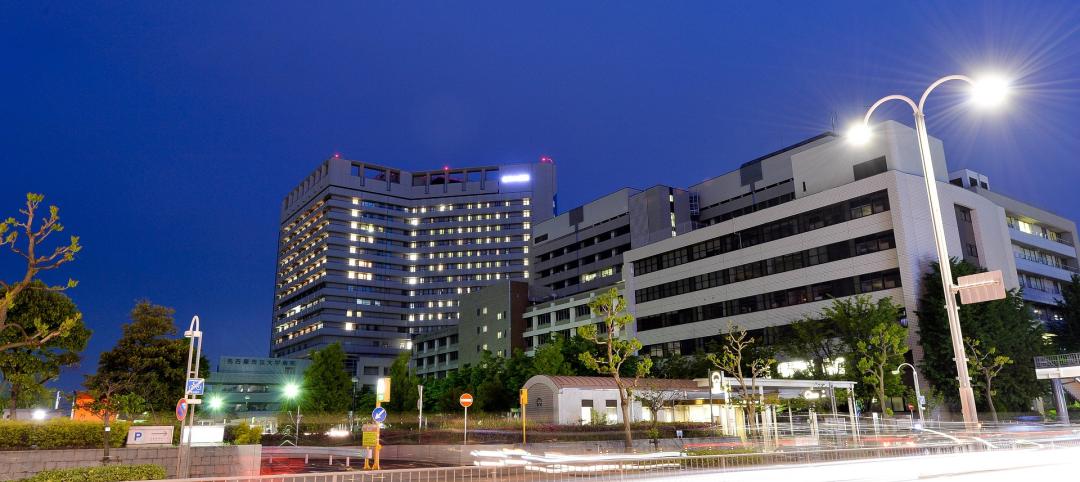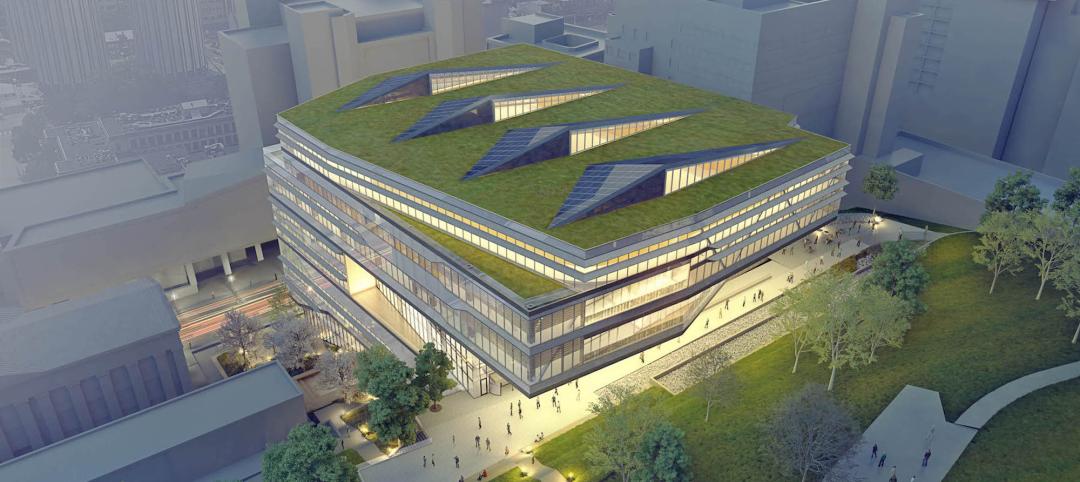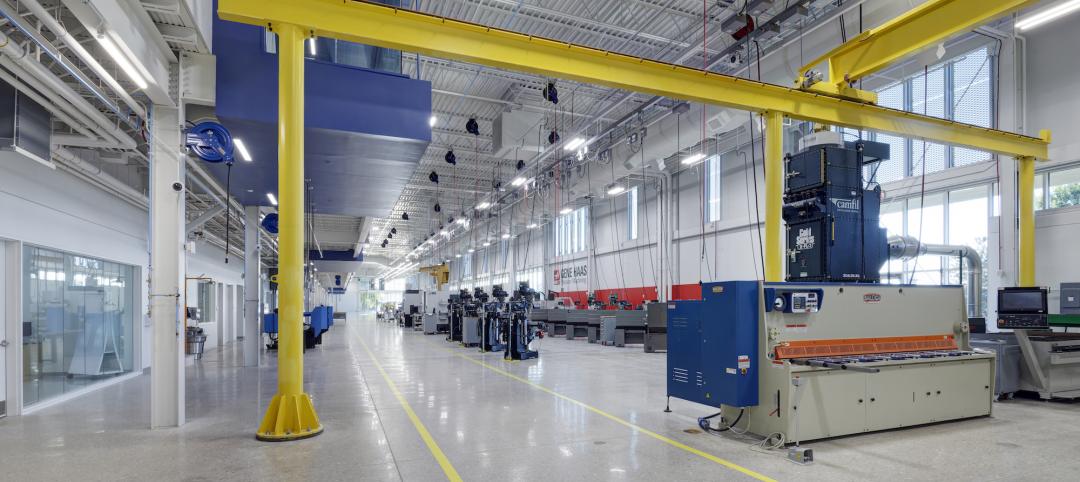The U.S. Air Force’s Joint Base Harbor-Hickam in Honolulu, Hawaii, is currently in the midst of an $820 million housing privatization project that includes the delivery of 1,208 new homes, 438 rehabilitated historic homes, housing and maintenance offices, two community centers, and a recreational sports complex.
At the heart of the project by developer Hickam Communities, Honolulu, Hawaii, is the reconstruction of the former Non-Commissioned Officer’s Mess Building (NCO Club), now known as the Ka Makani Community Center.
In 1935, Captain Howard B. Nurse designed the neighborhood master plan for Hickam, which included the NCO Club as a gathering place for noncommissioned officers and their spouses for rest and recreation.
Designed by Jozef B. A. Van Oort, a Dutch architect who came to Hawaii in 1935 and served as a chief architect of the U.S. Army Quartermaster Corps Construction Services, the single-story, cross-shaped concrete building is replete with Art Deco and Moderne details as well as with prominent Hawaiian tropical elements.
PROJECT SUMMARY
Ka Makani Community Center
Honolulu, HawaiiBuilding Team
Submitting firm: Lend Lease
Owner/developer: Hickam Communities LLC
Architect/architectural engineer: Mason Architects Inc.
Structural engineer: Shigemura, Lau, Sakanashi, Higuchi & Associates Inc.
MEP engineer: Lincolne Scott Inc.
General contractor/construction manager: KPRS Hawaii Construction Inc.
Construction/program manager: Lend LeaseGeneral Information
Size: 9,191 sf building
Construction cost: $5.6 million
Construction period: June 2009 to March 2011
Delivery method: Design-build
“Deco ornamentation is present in the large fluted column within the entry lanai and Moderne details are evident in the wide-radius corners,” says Julianne Polanco, director of cultural resources, Lend Lease, Schofield Barracks, Hawaii. “The building’s hip roof, wide roof overhangs, and large wood-framed sliding windows and doors are common to the Hawaiian-tropical style, as are the screened lanai, acid-stained concrete floors, and patterned concrete stamping.”
SUBTRACTION BY ADDITION
Over time, several additions–– a large, warehouse-like ballroom, a new kitchen, a laundry facility, mechanical equipment, even a barber shop––were made. The NCO Club ballooned in size to 26,000 sf, ultimately obscuring its cross-shape design.
Eventually, the building’s two lanais were permanently closed, the ceilings were lowered, the walls were covered with faux wood paneling, floors were carpeted, and the roof was covered with asphalt.
As the Hickam Communities’ rehabilitation project gained steam in 2009, it was evident that the former NCO Club, which had been abandoned for 15 years, should be rehabilitated as a community center and focal point of the housing development.
RETURNING TO THE ORIGINAL FOOTPRINT
The Building Team used Van Oort’s original drawings as a basis for the reconstruction of the NCO Club. However, there were still details that had yet to be discovered. “While we had an understanding of what was and was not the original building, it was the condition of the materials hidden by various upgrades and additions that remained unknown until construction commenced,” says Polanco.
All of the post-1941 additions to the exterior were removed, reducing the footprint of the building back to the original 10,000 sf. The lanai and dining terrace were reopened, original entry lanai light fixtures were refurbished and reinstalled. The original ceiling in the former lounge was exposed, revealing open beams with articulated wood molding painted in teal and gold. Faux wood paneling and lowered ceilings were removed, exposing portions of several large historic murals that were nearly destroyed by the previous alterations.
“The murals, hidden behind the additions to the building, were revealed. Unfortunately, the condition of the murals was such that they could not be retained or restored. As homage to their existence, the interior now has a few small decorative painted elements. The reintroduction of folding glass panel doors and the lanais were two elements that returned the building to its original charm,” says Polanco.
The general floor plan was retained, although some modifications were made to meet current needs. For example, the lounge became a multiuse room; the dining room was enlarged to become the entertainment room; the former card room was transformed into a fitness center; and the bar evolved into a computer room.
New wood flooring was installed in the main lobby and in the former lounge. The stone-line patterned acid-stained concrete floors in the old dining rooms were also restored to what Polanco calls “their original glory.”
“The retention of the concrete floors and other character-defining features allows visitors to share the same experience as visitors of the past,” says Polanco.
In addition being honored with a Silver Award in Building Design+Construction’s 2011 Reconstruction Awards, the Ka Makani Center has also won a Preservation Honors Award from the Historic Hawaii Foundation. It is also eligible for listing in the National Register of Historic Places.
“The rehabilitation of this building has been a success on many levels,” says Polanco. “From an aesthetic standpoint, the building has been returned to its rightful place as a graceful and pleasing focal point to the intentionally designed historic district.” +
Related Stories
Codes and Standards | Feb 1, 2023
New Jersey to allow private firms to conduct construction inspections
New Jersey recently passed a law that will allow towns to supplement construction code enforcement with help from the private sector. The legislation, which received bipartisan support, also allows municipalities to enter into shared service agreements with neighboring towns for construction inspections.
Sports and Recreational Facilities | Feb 1, 2023
University of Houston opens 'game changer' wellness center at downtown campus
The University of Houston-Downtown (UHD) recently opened its new Wellness & Success Center (WSC). The $39 million, 75,000 sf facility greatly improves the quality of the school’s exercise programs and areas dedicated to them. It also establishes a dynamic core and recognizable landmark for fostering and nurturing an on-campus community, according to a news release from SmithGroup, which designed the building along with HarrisonKornberg Architects.
Giants 400 | Feb 1, 2023
2022 Cultural Facilities Giants: Top architecture, engineering, and construction firms in the U.S. cultural facilities sector
Populous, DLR Group, KPFF, Arup, and Turner Construction head BD+C's rankings of the nation's largest cultural facilities sector architecture, engineering, and construction firms, as reported in the 2022 Giants 400 Report. Building types include museums, public libraries, performing arts centers, and concert venues.
Giants 400 | Jan 31, 2023
2022 Retail Giants: Top architecture, engineering, and construction firms in the U.S. retail building sector
Gensler, CallisonRTKL, Kimley-Horn, Henderson Engineers, Whiting-Turner Contracting, and Turner Construction top BD+C's rankings of the nation's largest retail sector architecture, engineering, and construction firms, as reported in the 2022 Giants 400 Report.
Giants 400 | Jan 31, 2023
2022 Government Sector Giants: Top architecture, engineering, and construction firms in the U.S. government buildings sector
Gensler, Jacobs, Hensel Phelps, and Page top BD+C's rankings of the nation's largest government sector architecture, engineering, and construction firms, as reported in the 2022 Giants 400 Report.
Healthcare Facilities | Jan 31, 2023
How to solve humidity issues in hospitals and healthcare facilities
Humidity control is one of the top mechanical issues healthcare clients face. SSR's Lee Nordholm, PE, LEED AP, offers tips for handling humidity issues in hospitals and healthcare facilities.
University Buildings | Jan 30, 2023
How wellness is reshaping college recreation centers
Moody Nolan, a specialist in the design of college recreation centers, has participated in the evolution toward wellness on college campuses.
Mass Timber | Jan 30, 2023
Net-positive, mass timber building will promote research on planetary well-being in Barcelona
ZGF Architects, along with Barcelona-based firms MIRAG and Double Twist, have designed a net-positive, mass timber center for research on planetary well-being. Located in Barcelona, the Mercat del Peix Research Center will bring together global experts in the experimental sciences, social sciences, and humanities to address challenges related to the future of the planet.
AEC Tech | Jan 27, 2023
Epic Games' latest foray into the AEC market and real estate industry
From architecture to real estate, the realm of computer-aided design hits new heights as more and more firms utilize the power of Epic Games’ Twinmotion and Unreal Engine.
University Buildings | Jan 27, 2023
Ozarks Technical Community College's advanced manufacturing center is first-of-a-kind in region
The new Robert W. Plaster Center for Advanced Manufacturing at Ozarks Technical Community College in Springfield, Mo., is a first-of-a-kind educational asset in the region. The 125,000-sf facility will educate and train a new generation in high tech, clean manufacturing and fabrication.


